Episodes
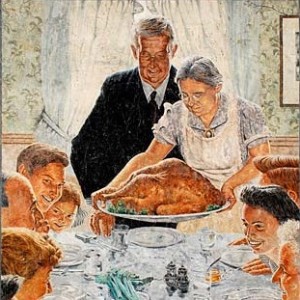
Tuesday Nov 26, 2019
Thanksgiving in Literature and Life with Dr. Glenn Arbery
Tuesday Nov 26, 2019
Tuesday Nov 26, 2019
St. Paul wrote to the Christians in Ephesus, “always and for everything giving thanks in the name of our Lord Jesus Christ to God the Father.” And it is, you know, more of a commandment than a suggestion. As Catholics giving thanks is a daily obligation. “No duty is more urgent,” said St. Ambrose, “than that of returning thanks.” The Holy Mass itself is the Eucharist, a word taken from the Greek word εὐχαριστία, thanksgiving.
Having said that about daily thanks, it is good and wise to set aside specific days or seasons to give thanks. The blessings we enjoy day-to-day as Americans are unprecedented in history. And yet so often, rather than reflecting gratitude back to God, we quietly think, “So what have you done for me lately?”
This week of Thanksgiving, Wyoming Catholic College President, Dr. Glenn Arbery reflects a bit about gratitude in the spiritual life, the life of Wyoming Catholic College, and in literature.
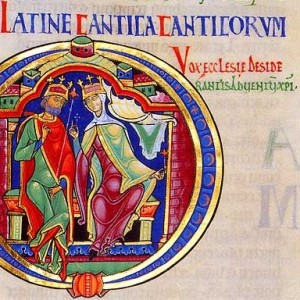
Tuesday Nov 19, 2019
Lovers in Latin: Reading Canticum Canticorum with Dr. Michael Bolin
Tuesday Nov 19, 2019
Tuesday Nov 19, 2019
“Adiuro vos, filiae Ierusalem, per capreas cervasque camporum,
ne suscitetis neque evigilare faciatis dilectam, quoadusque ipsa velit.”
The quote is from the Latin text of the Song of Songs in the Old Testament. “I adjure you, O daughters of Jerusalem, by the gazelles or the hinds of the field, that you stir not up nor awaken love until it please.” (Song 2:7)
That biblical book in Latin is the subject of one of four Latin reading groups here at Wyoming Catholic. Juniors and seniors hone the Latin skills they learned as freshmen and sophomores. The best way to retain and grow language skills is, of course, to use them.
The group working way through Canticum Canticorum ably led by Dr. Michael Bolin, our guest for this After Dinner Scholar.
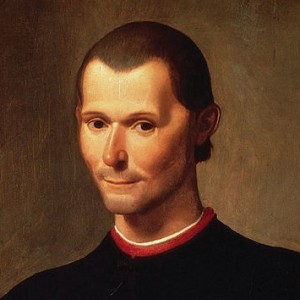
Tuesday Oct 22, 2019
On Getting Whatever You Desire: La Mandragola with Dr. Kent Lasnoski
Tuesday Oct 22, 2019
Tuesday Oct 22, 2019
“Because life is brief…let us follow our desires” has a rather contemporary ring to it. Yet those words were penned in 1512 by the playwright, philosopher, and politico Niccolò Machiavelli in his play La Mandragola, The Mandrake.
Machiavelli is, of course, best known for his book The Prince that gives advice on how to rule. That book contains observations such as, “All ethical and moral values are arbitrary artifacts from the cultures that set them forth. All political and military greatness is derived from ignoring them.”
La Mandragola is, in a sense that kind of thinking turned into a play and Dr. Kent Lasnoski, our guest this week, has been teaching that play to our students with amazing results.
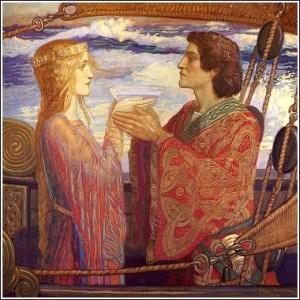
Tuesday Oct 08, 2019
Brave Knights, Lovely Ladies, and Medieval Romances with Dr. Tiffany Schubert
Tuesday Oct 08, 2019
Tuesday Oct 08, 2019
The prioress in Geoffrey Chaucer’s Canterbury Tales is something less than a humble holy woman. She lives a comfortable even luxurious lifestyle. She values her lap dogs above most people. The rosary she carries is made with precious stones and she wears a golden brooch on which is engraved “Amor Vincit Omnia,” “Love conquers all.”
The romantic notion the “Love conquers all” is hardly a relic of the past. To judge by many modern movies,TV shows, popular songs, and books, we still dream of being overcome by the power of love and swept into a happily-ever-after.
And that idea has been around for at least 1,000 years beginning with the medieval romances.
Dr. Tiffany Schubert recently led a faculty symposium about Medieval romances here at Wyoming Catholic College. Dr. Schubert is our guest this week on The After Dinner Scholar.
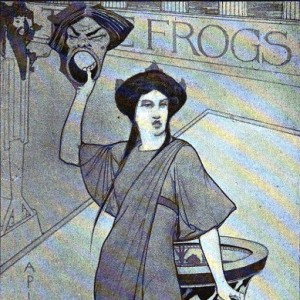
Tuesday Sep 17, 2019
Tuesday Sep 17, 2019
Athens had been at war more or less continually since 431 BC and the people on all sides were sick of it. So it may be of no surprise that in 405 BC at the Lenaia, Athens’ annual theater festival, first prize went to a comedy: Aristophanes’ “The Frogs.”
“The Frogs” comes to the modern reader as something as a surprise. The ancient play seems to have strong notes of the Shakespearean comedies, of Oscar Wilde, and of Monty Python’s Flying Circus. Which is to say, it has the feel of something that could have been written today in spite of being more than 2,400 years old.
Dr. Tiffany Schubert and Dr. Kent Lasnoski are team teaching our junior humanities course and joined me to talk about “The Frogs,” comedy, and satire beginning with the historical context in which Aristophanes wrote.
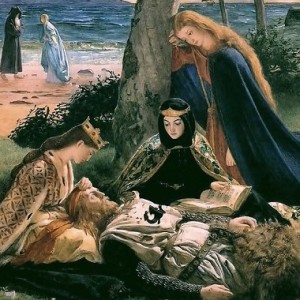
Tuesday Aug 13, 2019
Tuesday Aug 13, 2019
To judge by the piles of books, reels of movie film, games, prequels, and sequels, it’s safe to say that the stories of Camelot, the Round Table, and King Arthur hold a special place in our imaginations.
The stories surrounding Arthur have it all: love and romance; marriage and adultery; noble and good deeds, dishonorable and evil deeds; friendship and betrayal; lively feasts and deadly battles; magical swords and malicious witchcraft; heroes and villains; valiant, true, and brave knights and vile scoundrels. Camelot! It all started so well and ended so badly.
This summer, high school students attending Wyoming Catholic College’s two-week long PEAK program studied the Arthurian stories with this week's guest, Dr. Tiffany Schubert.
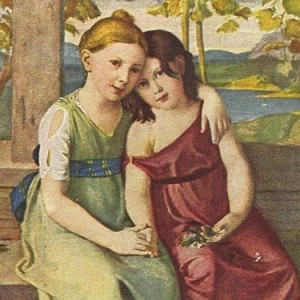
Tuesday Jul 30, 2019
Friendship in an Age of Romance by Dr. Tiffany Schubert
Tuesday Jul 30, 2019
Tuesday Jul 30, 2019
“I am distressed for you, my brother Jonathan;” lamented King David, “very pleasant have you been to me; your love to me was wonderful, passing the love of women.” (2 Samuel 1:26)
Understanding the kind of friendship that existed between David and Jonathan is difficult in our culture. In large measure this is because we tend to believe that the height of love is romantic love. The notion that Jonathan’s love to David passed the love of women thus sounds at least suspect.
But the idea that romantic love is the greatest love was not part of the culture of ancient Israel. It was not part of the culture of ancient Greece—the world of Achilles and Patroklos. It was not part of the culture of Europe until… well, Dr. Tiffany Schubert can explain. At the 2019 Wyoming School of Catholic Thought, Dr. Schubert began her discussion of the poetry of friendship by describing how the exaltation of the romantic through the poetic tradition has become a detriment to us as we try to form deep, committed friendships.
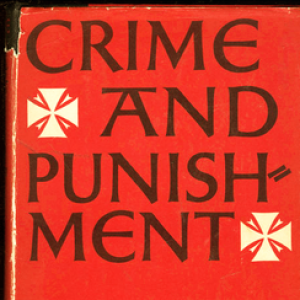
Tuesday Jul 23, 2019
"Unexpected Friendship: The Murderer and the Harlot" by Dr. Virginia Arbery
Tuesday Jul 23, 2019
Tuesday Jul 23, 2019
“On an exceptionally hot evening early in July a young man came out of the garret in which he lodged in S. Place and walked slowly, as though in hesitation, towards K. bridge.
“He had successfully avoided meeting his landlady on the staircase. His garret was under the roof of a high, five-storied house and was more like a cupboard than a room. The landlady who provided him with garret, dinners, and attendance, lived on the floor below, and every time he went out he was obliged to pass her kitchen, the door of which invariably stood open. And each time he passed, the young man had a sick, frightened feeling, which made him scowl and feel ashamed. He was hopelessly in debt to his landlady, and was afraid of meeting her.”
Thus begins Fyodor Dostoyevsky’s novel Crime and Punishment. "He" in this case is Rodion Romanovich Raskolnikov, a college drop-out living in abject poverty in 19th century St. Petersburg, Russia. Consumed with misery, anger, and a strange sense of self-importance, Raskolnikov will in the course of the novel commit a double murder plunging him even deeper into despair.
Along the way, he meets Sonia Marmeladov. She is the child of a hopeless drunk who, in order to support her father, his second wife, and his step-children, sells the only thing she possesses: herself in prostitution.
How the friendship between harlot and the murderer becomes the source of redemption is the topic of the novel and was the topic Dr. Virginia Arbery addressed at the 2019 Wyoming School of Catholic Thought. This is what she had to say.

Tuesday Jul 02, 2019
"Friendship between Women: Jane and Elizabeth Bennet" by Dr. Tiffany Schubert
Tuesday Jul 02, 2019
Tuesday Jul 02, 2019
“‘My dear Jane,’ exclaimed Elizabeth, ‘you are too good. Your sweetness and disinterestedness are really angelic; I do not know what to say to you. I feel as if I had never done you justice, or loved you as you deserve.’”
“Miss Bennet eagerly disclaimed all extraordinary merit, and threw back the praise on her sister’s warm affection.”
One of the exemplary friendships we studied at this year’s Wyoming School of Catholic Thought was the friendship between Elizabeth Bennet and her sister Jane in Jane Austen’s Pride and Prejudice.
What characterized this friendship between women? Why is their relationship so appealing? And what can we learn from it to inform our own friendships.
Wyoming Catholic College Teaching Fellow Dr. Tiffany Schubert has been a Jane Austen fan and scholar for many years. Here is her presentation delivered this past June 10.
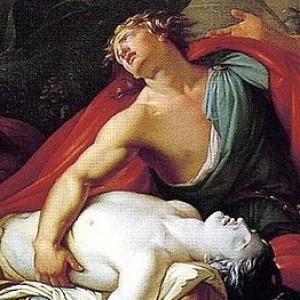
Tuesday Jun 25, 2019
Friendship Between Men in The Iliad and in Moby Dick by Dr. Glenn Arbery
Tuesday Jun 25, 2019
Tuesday Jun 25, 2019
When we came up with the theme for this year’s Wyoming School of Catholic Thought—“No Greater Gift: Friendship from The Iliad to Facebook”—we knew that we wanted Wyoming Catholic College president Dr. Glenn Arbery to discuss the friendship between Achilleus and Patrokolos in Homer’s epic.
What no one expected was that Dr. Arbery would pair the friendship between Achilleus and Patrokolos with the friendship Herman Melville described in Moby Dick, the strange friendship between Ishmael and Queequeg.
Here are Dr. Arbery’s comments.

